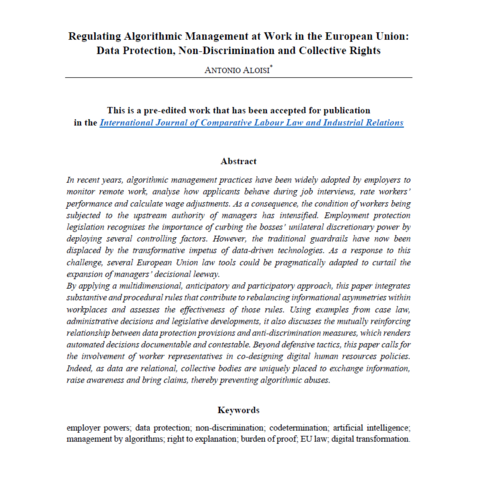Recent searches
Search options
NEW draft available: “Regulating #AlgorithmicManagement at Work in the European Union: Data Protection, Non-Discrimination and Collective Rights”, part of my @BossExMachina@twitter.com @MSCActions@twitter.com project, forthcoming in the IJCLLIR. Now available at @SSRN@twitter.com: https://ssrn.com/abstract=4235261
Algorithms are playing bosses’ roles and becoming involved in all workplace decisions. Following the emergence of bureaucratic entities, employment-related limits have evolved to cater for the transformation of production models & the parallel intensification of employer powers.
Too often, #algorithmicmanagement has been dissected in its constitutive phases and analysed from narrow perspectives, typically using field-specific disciplinary viewpoints. In addition, the prior literature has predominantly provided retrospective or complaint-led answers.
Both postures are reasonable when prompted by the need to reduce complexity and restore the alleged victims of abuses, although they entail drawbacks that this paper aims to overcome using a multidimensional, preventive and collective approach (https://ssrn.com/abstract=4235261).
This paper reconnects seemingly unconnected domains such as #dataprotection & #nondiscrimination, thanks to examples from case law and legislative developments such as the proposed #PlatformWork Directive. To fill the gaps, it uses employee involvement as a ‘force multiplier’.
A multisource corpus of rules can be leveraged to render decision-making accountable, explicable & questionable, reshaping company practices. Current tools can be used cumulatively to force the disclosure of the underlying logic of algorithms and promote workers’ involvement.
Worker involvement is a strategy that has the advantage of avoiding the self- or de-regulatory tendencies that could arise from approaches focused on #ethicalcodes or #auditing, which are gaining prominence in the policy debate despite lacking any meaningful binding force.
It consists of (i) the collective negotiation of the adoption and development of algorithmic tools at work, (ii) knowledge sharing with a view to promoting fact-finding and litigation, (iii) the co-design of data-driven company practices to ensure that they are worker-centred.
#LabourLaw tools have kept abreast of the ‘human-in-command’ function in an integrationist sense due to the alliance with fields such as data protection & equality law. An inventive blend of old and modern counterpowers can play a crucial role amid the algorithmic turbulences.
Comments are very welcome. This paper has largely benefitted from generous feedback offered by many friends and colleagues. I am thankful to all of them for being part of this collective effort. For more on the Marie Curie project, see https://bossexmachina.ie.edu/ CC @ielawschool@twitter.com


